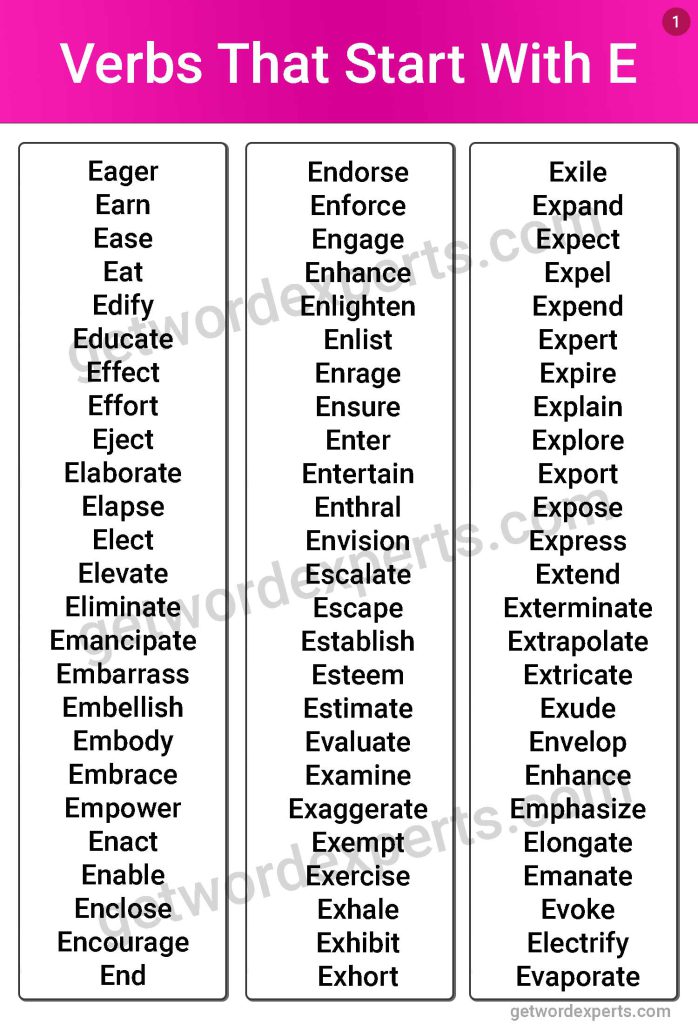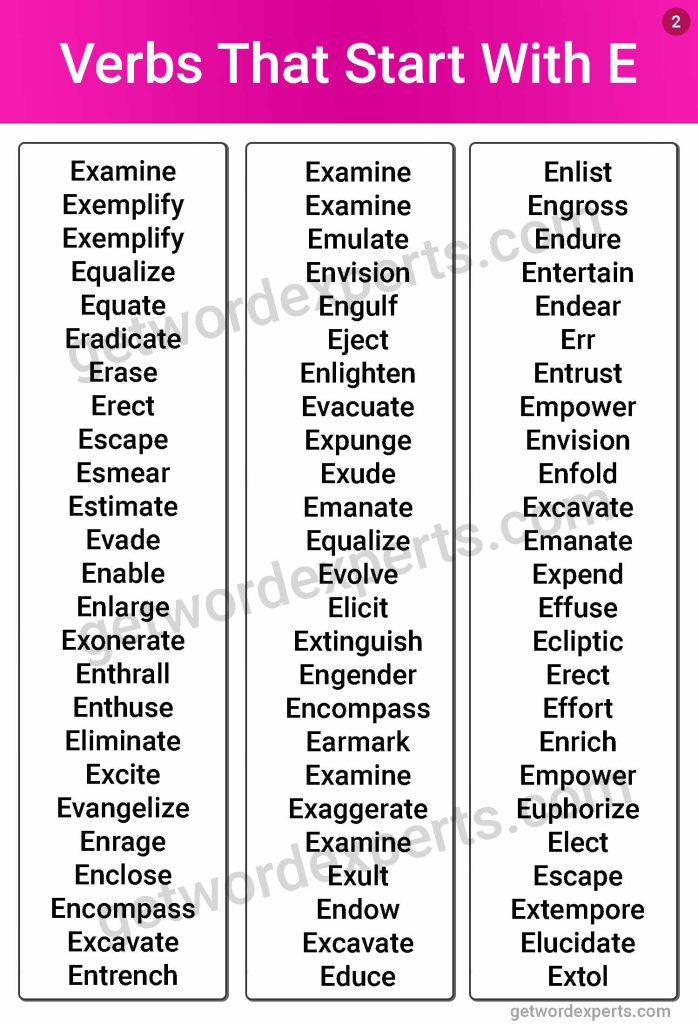Verbs that start with E add energy, emotion, and eloquence to our language. Whether you’re looking to enrich your vocabulary or find the perfect word to describe an action, this guide explores a variety of verbs that start with E, with their meanings, examples, and usage tips. Let’s dive into these engaging verbs and see how they can enhance your writing and speaking skills.
Why “E” Verbs Are Essential in English
Verbs that begin with E encompass a range of actions and states, from the everyday to the more sophisticated. These verbs are versatile, suitable for different contexts, and especially useful for adding a touch of formality or description. Let’s explore how “E” verbs can be grouped for easier understanding and application.
Categorized List of Verbs That Start With E
To help you navigate through the many “E” verbs, we’ve organized them into categories based on function. Here’s a breakdown:
Action Verbs
Action verbs are crucial for narrating events or expressing dynamic actions. Here’s a list of common action verbs starting with “E” along with examples:
| Verb | Definition | Example |
|---|---|---|
| Earn | Receive money as payment for work | “She works hard to earn a living.” |
| Enter | To go into a place | “Please enter through the main door.” |
| Explore | Travel or investigate | “They decided to explore the island.” |
| Expand | To increase in size or scope | “We plan to expand the business.” |
| Escape | To get free from something | “He managed to escape the situation.” |
Regular Verbs
| Verb | Definition | Example Sentence |
|---|---|---|
| Educate | To teach or provide knowledge | “Teachers educate students about history.” |
| Enjoy | To take pleasure in | “She enjoys painting during the weekends.” |
| Enhance | To improve or increase in quality | “They enhanced the website design.” |
| Erase | To remove or delete completely | “He erased all mistakes from the document.” |
| Encourage | To give support or inspire | “Her words encouraged him to succeed.” |
| Explain | To make clear or understandable | “Can you explain this math problem to me?” |
Irregular Verbs
| Verb | Definition | Example Sentence |
|---|---|---|
| Eat | To consume food | “She eats breakfast every morning.” |
| Erode | To wear away gradually | “Wind erodes the cliffs over time.” |
| Eject | To remove forcefully | “The referee ejected the player from the game.” |
| Elope | To run away secretly to marry | “They eloped to avoid a big wedding.” |
| Enlighten | To give insight or understanding | “Traveling enlightened him about other cultures.” |
Descriptive Verbs
Descriptive verbs help add depth and detail to writing. Here are a few with their uses:
| Verb | Definition | Example |
|---|---|---|
| Embellish | Make something more attractive by adding details | “She likes to embellish her stories.” |
| Elevate | Raise to a higher position or level | “The promotion elevated his status.” |
| Embrace | Hold closely as a sign of affection | “They embraced warmly after a long time apart.” |
| Engrave | To carve into a material | “They engraved their names on the tree.” |
Phrasal Verbs
| Verb | Definition | Example Sentence |
|---|---|---|
| Ease up | To reduce intensity or pressure | “The coach told them to ease up during practice.” |
| Eat up | To consume eagerly or completely | “The toddler ate up all her food.” |
| End up | To reach an outcome, often unexpectedly | “They ended up winning the match after all.” |
| Embark on | To start a new journey or project | “She embarked on a journey to learn French.” |
| Echo back | To reflect or repeat back sound or words | “The cave echoed back their shouts.” |
Positive Verbs
| Verb | Definition | Example Sentence |
|---|---|---|
| Empower | To give strength or authority to | “The training empowered her to take on the project.” |
| Elevate | To raise to a higher level or position | “A positive mindset elevates overall happiness.” |
| Encourage | To inspire confidence | “Her achievements encouraged the entire team.” |
| Endorse | To publicly support | “The community endorsed the charity event.” |
| Enrich | To improve quality or add value | “Travel can enrich one’s perspective on life.” |
Emotion-Expressing Verbs That Start With E
These verbs are great for conveying emotions and adding depth to descriptions.
| Verb | Definition | Example |
|---|---|---|
| Empathize | Understand and share another’s feelings | “She empathized with his struggles.” |
| Enrage | Cause to feel intense anger | “The unfair decision enraged the crowd.” |
| Enthrall | Capture the fascinated attention of | “The story enthralled the young audience.” |
| Excite | Cause strong enthusiasm | “The game excited the fans.” |
Formal and Academic Verbs That Start With E
Perfect for essays, research, and professional settings, these verbs help convey meaning with precision.
| Verb | Definition | Example |
|---|---|---|
| Elucidate | Make something clear | “She asked him to elucidate the theory.” |
| Enumerate | Mention a number of things one by one | “The speaker enumerated the key points.” |
| Exonerate | To absolve from blame | “The new evidence exonerated him.” |
| Extrapolate | Extend known information to an unknown situation | “Scientists extrapolate data from experiments.” |
Specialized Verbs That Start With E
- Elicit – To draw out a response, usually in research or social sciences.
- Emancipate – To free from social, legal, or political restrictions, often used in historical or legal contexts. “The movement aimed to emancipate those under oppressive regimes.”
- Epitomize – To be a perfect example of a particular quality or concept.“Her work ethic epitomizes the dedication we value in our company.”
- Eradicate – To completely destroy or eliminate, often used in healthcare or social reform contexts.“Efforts to eradicate the disease have shown promising results.”
- Expedite – To speed up a process, common in logistics or business.“They hired extra staff to expedite the shipping process.”
- Extrapolate – To extend or predict based on existing data, frequently used in science and data analysis.“Scientists can extrapolate trends from this year’s data to make predictions.”
- Elucidate – To make something clear, often used in academic or technical writing.“The professor took time to elucidate the complex theory.”
- Encapsulate – To summarize or condense, commonly used in writing and programming.“The introduction should encapsulate the main points of the article.”
- Excoriate – To criticize harshly, often seen in journalism or literary criticism.“The article excoriated the politician’s actions during the crisis.”
- Electroplate – To coat with a thin layer of metal via electrochemical means, a specialized term in manufacturing.“They electroplate the parts to prevent corrosion.”
Advanced Vocabulary: Uncommon “E” Verbs
For advanced learners or those wanting a sophisticated edge, here are some less common “E” verbs to consider. These are especially useful in formal or academic contexts:
- Extol – To praise enthusiastically. They took time during the ceremony to extol her impressive accomplishments.
- Exacerbate – To worsen or make more severe. “Pollution can exacerbate health issues.”
- Emulate – To imitate with the intent to match or surpass. “He strives to emulate the dedication and work ethic of his mentor.”
- Exonerate – To clear from blame or guilt. “The investigation exonerated her.”
- Enervate – To weaken or drain of energy. “The long hike in the heat enervated him completely.“
- Engender – To cause or give rise to something. “The new policy engendered a sense of hope among the workers.“
- Exculpate – To clear from guilt or blame. “The lawyer’s defense exculpated the defendant from all charges.“
- Eviscerate – To remove the vital parts of; to disembowel. “The critic’s review eviscerated the film’s plot.“
- Exhort – To strongly encourage or urge someone to take action. “The coach exhorted the players to give their best performance.“
- Eschew – To deliberately avoid or abstain from. “He eschewed processed foods in favor of a healthier diet.“
- Enumerate – To list or mention one by one. “She enumerated all the tasks she had completed during the day.”
Examples and Usage Tips
Using these verbs in sentences not only helps clarify their meaning but also shows how they can be effectively used. Here are some tips:
- Vary Your Usage: Don’t stick to the same verbs. Experiment with a variety of ‘E’ verbs to add nuance and precision to your writing.
- Context Matters: Some verbs like “elucidate” or “exonerate” are more formal, so they fit better in professional or academic settings than casual conversation.
- Use Examples as a Guide: Refer back to examples to understand proper verb placement and context.
Common Mistakes to Avoid with “E” Verbs
Even experienced writers can make errors when using verbs, especially when they’re similar in meaning or form. Check out these tips to help you steer clear of common mistakes:
- Effect vs. Affect: While both relate to influence, “affect” is usually a verb (e.g., “The news affected her deeply”), and “effect” is a noun (e.g., “The effect was immediate”).
- Emigrate vs. Immigrate: “Emigrate” is used when referring to leaving one’s own country to settle in a new one, whereas “immigrate” refers to entering a new country to live there.
- Elude vs. Allude: “Elude” means to escape, while “allude” means to refer to something indirectly.
Images Of Verbs That Start With E


Conclusion
Expanding your vocabulary with verbs that start with E can make your language more vivid and engaging. These verbs provide precision, allowing you to express a wide range of actions and emotions. Whether you’re crafting an email, writing an essay, or just seeking to enhance your spoken language, having a repertoire of “E” verbs is invaluable. Keep exploring and practicing, and soon, these words will become second nature in your communication toolkit.
Frequently Asked Questions
What are some common verbs that start with “E”?
Some frequently used “E” verbs include earn, explore, empathize, and elaborate.
Why is it important to have a strong verb vocabulary?
A rich vocabulary, especially with verbs, adds precision and variety to your communication, making it more engaging and effective.
Are there any formal verbs that start with “E”?
Yes, verbs like elucidate, enumerate, and exonerate are excellent choices for formal or academic contexts.
Q: How can I avoid common verb mistakes?
Familiarize yourself with frequently confused verbs (like affect vs. effect) and practice using them correctly in sentences.

